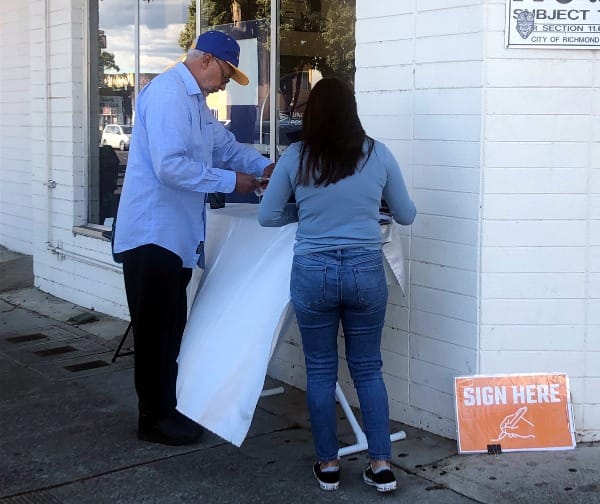

A petition to introduce primary municipal elections in Richmond City elections has been certified by the Contra Costa County Clerk-Recorder-Elections Department.
Backers of the Richmond Election Reform Act submitted 15,139 to the election’s office on March 20, said Helen Nolan, Assistant Registrar-Contra Costa County.
“The petition was determined to be sufficient and certification has been returned to the City,” Nolan said.
 Grandview IndependentSoren Hemmila
Grandview IndependentSoren Hemmila
If voters pass the initiative, it would amend the Richmond City Charter to introduce primary municipal elections, which backers say would ensure that elected officials receive a majority of the votes.
Opponents have called the initiative a 'Voter Suppression Measure", which will make it harder for progressives to get elected to the Richmond City Council.
Currently, candidates can win a seat on the dais with less than a majority, but the initiative’s backers say they may not have the support of most voters.
In a primary municipal election, voters would choose their preferred candidate. If no candidate receives a majority, the two candidates with the most votes will move on to a general municipal election.
Four unions financed the signature-gathering effort, including the Richmond Police Officers Association, Plumbers and Steamfitters Local 342, International Brotherhood of Electrical Workers Local 302, and the Boilermakers Union Local 549.
The Richmond Progressive Alliance has taken a position to oppose the ballot measure. The RPA is a political group based in Richmond that advocates for candidates and policies that align with progressive values.
According to RPA member Sue Wilson, the ballot measure is not a sincere attempt to reform elections but a cynical scheme to rig the election system.
“Only 4 percent of California cities use a primary for city races – 96 percent of cities do the same thing we do now for city races (a plurality election where the person with the most votes in the November election wins.)” Wilson wrote in a report on the February 10 ‘No on Richmond Primary Measure’ RPA Membership Roundtable. “The claim that we’re currently doing something undemocratic, or unfair, that needs to be fixed, is untrue, and the measure organizers know that.”
Disenfranchisement is the true intent of the ballot measure, according to Wilson. With significantly fewer people voting in primary elections, the measure will make the votes of low-income people, people of color, and youth less powerful.
“And it’s very clear who doesn’t participate in primary elections. Lower-income people, people of color, and younger people are the ones most likely not to take part in the primary voting. If this measure passes, they would be the ones left out for the first, crucial part of the decision-making process for city races,” Wilson said.
Having a primary would mean having two elections eight months apart, so anyone running for city council would have to spend twice as much money and time, do twice as much work, and make it harder for regular people to be on city council.
“The organizers of this are hoping the whiter, wealthier and older people who vote in primaries will be more conservative in their voting and will use the primary to eliminate the more progressive candidates,” Wilson said.
Wilson stated that almost all of the money spent on the initiative was provided by the unions representing construction workers and police officers.
“The police officers and construction workers have clearly stated that they are doing this because they do not like who Richmond has elected to city council recently. They want to change election rules to make it easier to elect the candidates they prefer. They make no secret about this,” Wilson said.
Don Gosney, a proponent of the measure, said the union members elected to put this measure before the voters to ensure those elected to city council are more representative of the electorate.
Gosney said the process will be similar to how county supervisors are elected. In a multiple-candidate election, a candidate must receive at least 50 percent of the votes plus one additional vote to be declared the winner.
“This requirement ensures that the winning candidate has a clear majority of support,” Gosney said.
Gosney said a campaign strategy had emerged in Richmond, designed to divide the votes.
In the last election, Eduardo Martinez won the race for mayor with 10,319 votes or 39.20 percent of the votes. Shawn Dunning, Nat Bates, and Mark Wassberg received a combined 60.8 percent of the votes.
Three candidates ran in the last District 3 City Council race. Doria Robinson won with 39.62 percent of the vote, with Oscar Garcia and Corky Booze receiving a combined 60.38 percent.
In 2006, District 5 Councilmember Gayle McLaughlin won the mayoral election with 37.2 percent of the vote, beating Irma Anderson and Gary Bell, who received a combined 62.2 percent of the vote.
An item to place the measure on the November 2024 ballot is expected to go before the city council on May 7.
Help keep our content free for all!
Click to become a Grandview Supporter here. Grandview is an independent, journalist-run publication exclusively covering Richmond, CA. Copyright © 2024 Grandview Independent, all rights reserved.
